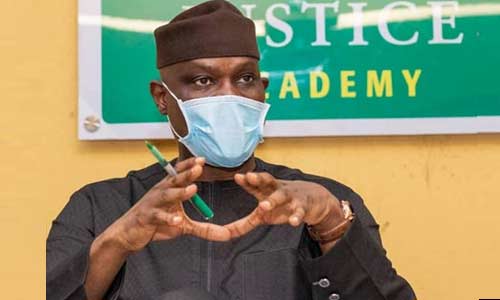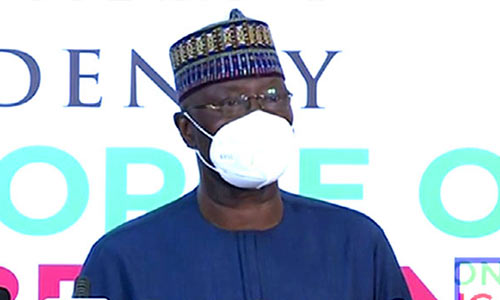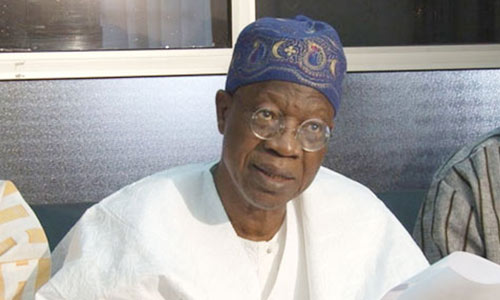By Reuben Abati
Turning and turning in the widening gyre The Falcon cannot hear the falconer; Things fall apart; the centre cannot hold; Mere anarchy is loosed upon the world, The blood-dimmed tide is loosed, and everywhere The ceremony of innocence is drowned; The best lack all conviction, while the worst Are full of passionate intensity Surely some revelation is at hand… – W.B. Yeats, The Second Coming (1919)
The poem quoted above: “The Second Coming” by Irish poet William Butler Yeats (1919) is probably one of the most adapted and quoted poems in world literature, and in politics and culture, to describe moments of anxiety, uncertainty and a seeming “slouching towards” chaos and anarchy in any community. Written in 1919, in the context of the Spanish flu, after the First World War which ended in November 1918, and at the beginning of the Irish War of Independence (1919 – 1921), W.B. Yeats’s poem helps to encapsulate the horror, confusion, the disarray, the despair that has overtaken Nigeria in the last two weeks, in the wake of a revolt by Nigeria’s Generation Z, a generation that insists that they can no longer tolerate the failure of the Nigerian state and leadership. They are saying “Enough is Enough”, and they would not be deterred until they see concrete assurance that the change that they demand is in the horizon. The “slouching beast” of their protest is a notorious unit of the Nigeria Police: the much dreaded, now defunct Special Anti-Robbery Squad (SARS). SARS was known for its brutality, its indulgence in extra-judicial killing and the lives of many innocent Nigerians which its members deleted with impunity. Police brutality is not the only beast: the youths of Nigeria have since identified more beasts: a problematic foreign exchange rate, cybercrime and fraud, fuel price hike, legislators who are underworked and overpaid, terrorist herdsmen, unemployment, bad roads, a failed leadership elite – all of which combined threaten the future of the average Nigerian youth. They want to take charge of their own future. They want to take their country back as they now say – “#one-step-at-a-time”.
For the past two weeks however, the street protests that have been staged by the youths have assumed a new life, resulting in a great disruption. The protests have spread like wild fire, fuelled by innovation, creativity and “passionate intensity”. One striking feature of it is how it has taken the shape and form of community transmission, especially in Lagos where every neighborhood feels obliged to organize its own version of the protest. On Monday, October 19, the state of Lagos was practically on lockdown. Every major street junction was blocked by angry youths playing music, wielding placards of protest, and asking motorists to either join the protest or return home. At the Lekki end of the city, the Lekki toll gate has been shut down since the beginning of the protests. That particular spot has emerged as the nerve-centre of youth revolt, and a cultural melting pot where solidarity is the normative code, and rebellion is the spirit of the congregation.
In Abuja, critical road arteries were also blocked, effectively shutting down the entire Federal Capital Territory. The road to the International Airport was occupied. Northern Youths under the aegis of the Coalition of Northern Groups (CNG) are also protesting across the 19 states of the North. The difference between the protests in the North and the protests from the Middle Belt to the South lies in the emphasis by the Northern groups on the need to end insecurity in the North. Essentially, there is a meeting of minds among Nigerian youths, North or South, that something terrible has gone wrong with our country that needs to be fixed. The other exception that we have seen are those “rented” youths whose sponsors are yet unknown who attack the protesters in Abuja and Lagos, those who steal from youths who are fighting to save Nigeria, and those youths who are giving the emerging revolution a bad name by engaging in acts of violence.
The sad part of the protests so far is the degeneration into violence. What was conceived as and which began as a peaceful protest has now turned bloody. It has now been overtaken by the Nigerian factor. It would be most unfortunate if the protesters lose focus or they are pushed to do so. Amnesty International reported last week that about 10 persons had died in the course of the protests. The number has increased since hoodlums infiltrated the protests and policemen who had been warned by the Inspector General of Police began to shoot at protesters. The emerging picture is frightening. In Osogbo, Osun State on Saturday, the convoy of the State Governor, Adegboyega Oyetola was attacked. The Governor insists that it was an attempt to assassinate him. In Abuja, more than four deaths have been reported within a week. Yesterday, Benin City went up in flames. Police stations and vehicles were set ablaze. Prisoners jumped the fence at the Benin prison and escaped. Just as we defend the right to protest, any act of violence is also condemnable. It is in order to prevent this that the Nigerian Civil Society has been very vocal in insisting that the police, the military and other security agencies must not turn their guns on protesters, or arrest or detain or harass them. It is also in part why the decision of the Nigerian Army to launch Operation Crocodile Smile VI in the middle of a nationwide protest has been criticized for its bad timing. The explanation that the Operation has nothing to do with the #EndSARS protest has been dismissed as insincere. Soldiers have now been seen on the streets of Abuja, confronting #EndSARS protesters. Things are clearly falling apart…
The protesters claim that they are being provoked, or blackmailed, but as the days go by, it is difficult to identify a coherent strategy despite the gains that have been recorded. In the absence of an identified and structured leadership, the protest is at best amorphous. The Northern anti-insecurity protesters appear to be better organized. Every zone has a leader with published details. In the South, every man or woman who goes out to protest is a leader in his or her own right. This has resulted in internal bickering, and much in-fighting. Each member of the protest would seem to have an agenda of their own: from the adoption of protest as a new found vocation, or the enjoyment of the carnival-esque ambience of the protests. What needs to be watched also is the manner in which the protest in full flight is beginning to alienate those who should naturally be part of it. The organizers should also watch out against inflicting emotional pain and psychological violence on the same persons whose interests they are fighting for. We are all involved in the struggle to save Nigeria. There is no Nigerian who has not suffered a form of police brutality or the other or the impunity of uniformed state officials. The various stories that have been told convey our collective pain and the depth of our anguish, and the drowning of our innocence. But when protesters block a major highway, and all arterial roads from dawn to dusk, they inflict pain on innocent persons.
For days, people living in the Lekki part of Lagos have not been able to go to work or go about their daily business. When people go to work on the Island from the Mainland, they are not sure of what awaits them on the road. Protesters take over the roads and harass motorists. The Lagos Ibadan Expressway has been shut down repeatedly in the last two weeks. Transporters are put through enormous stress. The supply chain between Lagos and other parts of the country is disrupted. The economic impact of the on-going protest is huge. A newspaper investigation reveals that since the protests started in Lagos, the closure of the Lekki toll gate alone has resulted in a loss of about N234 million. When all this is over, is there any guarantee that the managers of that toll gate will not take it out on the young people who work daily at that toll gate. And there have been reports as well of persons who died in the last two weeks because they could not be rushed to the hospital because the roads have been blocked. All schools in Lagos have been shut down over #EndSARS protests. My point is this: while the right to protest is sacrosanct, it needs not extend to a violation of other people’s rights.
Nigeria faces a dilemma. How would the present crisis be resolved? The Federal Government has accepted all the five demands placed before it by Nigerian youths, North and South. It has dissolved the Special Anti-Robbery Squad. It has announced the establishment of a Special Weapons and Tactical Unit (SWAT), which has been roundly laughed off because of its peremptoriness and lack of originality. A total of 37 officers have either been reprimanded, demoted or dismissed from the Police for having been involved one or the other in the abuse of office and privilege. In Lagos, four officers have been named and are likely to face prosecution. At the last National Economic Council meeting chaired by the Vice President, Professor Yemi Osinbajo, it was agreed that every state government and the Federal Capital Territory should set up a judicial panel of inquiry to investigate all cases of police brutality and extra-judicial killing and ensure that justice is done. By yesterday, six states have set up the panels as agreed, and two – Lagos and Kaduna states- have inaugurated them. In addition, Vice President Yemi Osinbajo has personally offered Nigerian youths an apology. The First Lady, Mrs. Aisha Buhari has also called on the Nigerian government to “rescue the people.” Yesterday, the Minister of Youth and Sports Development, Sunday Dare after a meeting with the President at the Presidential Villa reported that the President has appealed to #EndSARS protesters to give government time to address their demands; they have spoken and he has heard and that the reforms they are asking for will happen.
Indeed, the protesters have achieved a lot in two weeks. They have demonstrated the power of solidarity and the importance of their voice. This generation of protesters is not ready to “off the mic”. They insist on being heard. Their voice is so clear, it has been amplified across the world by celebrities, governments and Nigerians in Diaspora who have taken to the streets in about 10 countries of the world to draw attention to the Nigerian crisis. We have seen impressive displays of character and humanism as the story of the revolution continues to unfold, the physically challenged like Jane Obiene and Charles Nnama – victims of police brutality – who joined the protest and got the support and adulation of others. The nursing mothers who took their children to join the protest. The elderly mothers who protested on behalf of all mothers who lost a son, a daughter, a husband or a relative to police brutality. An 89-year old citizen, Professor JTK Duncan showed up at the barricades, waving the Nigerian flag. Aisha Yesufu remains irrepressible. The Feminist Coalition, which has coordinated donations to the cause and the setting up of helplines is the very definition of responsible citizenship. We have also witnessed a harvest of creativity: new songs by Davido, Asa, Fikky, Kabex, Ripple Effect, Falz and M.I. Abaga which define the protest; many more are emerging: short skits, paintings, memes, ingenuous tweets…an online SORO SOKE radio platform, Nollywood movies in the making…The protest has been teleological, technological, poetic and physical.
But when and how will these protests end? The real protest is in the mind of every young Nigerian who has been disappointed by the Nigerian state and who prays for a better country. No one can put a final date to that. The youth of Nigeria will not begin to trust their governments because of a few concessions and fine rhetoric. When their country changes for the better, they will be the first to know. But protest as an event cannot be an end in itself. I believe that with the present outing, the time has come for an audit and a review of strategy after two weeks. The protesters must resist the temptation to be turned into shooting targets by a state that is becoming overwhelmed: in Lagos protesters reportedly took over the international airport; in Benin, prisoners escaped, and in the face of all that, some government officials are beginning to tell us that the government of Nigeria will not stand by and allow anarchy to reign. To whom it may concern: The time has come for a review of strategy and tactics.
As for the Federal Government of Nigeria, President Muhammadu Buhari should step forward and address the angry youths of Nigeria at home and in diaspora. He can no longer afford to speak through proxies and third parties. The protesters won’t listen to such persons. They don’t trust anyone at all at this moment. The Falcon can no longer pretend not to hear the Falconer. This is the time to change the narrative of the on-going protest, and only you, Mr. President can do it. Talk directly to the youths of Nigeria. Then sack one or two guilty persons to show that you truly believe in the principle of fairness. Seize the moment. Now.










